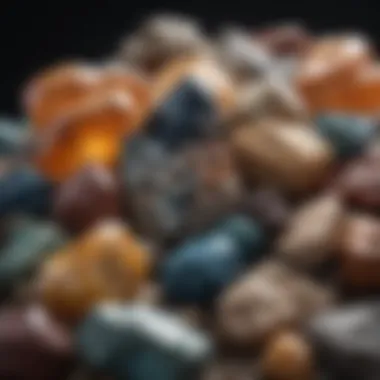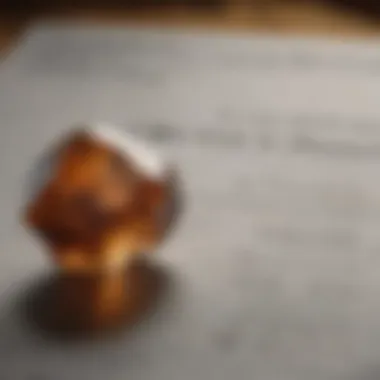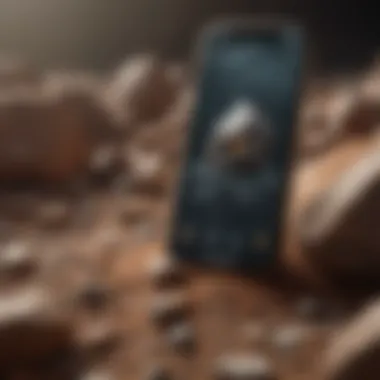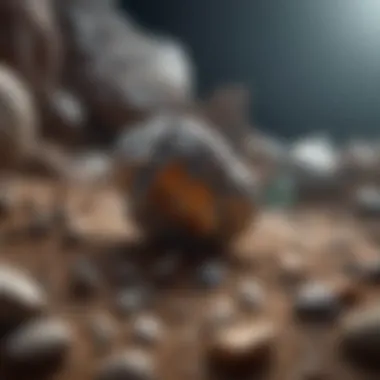Exploring the Online Marketplace for Minerals


Intro
The online market for minerals has seen remarkable growth in recent years. This shift has provided both seasoned collectors and newcomers with new opportunities. With the expansion of digital platforms, accessing information and purchases has become easier. However, navigating this landscape is not without its difficulties.
Authenticity remains a major concern when acquiring minerals online. Buyers must learn to identify genuine sellers from less trustworthy sources. Additionally, understanding the role of technology is crucial in this evolving space. As buyers rely more heavily on online resources, ethical considerations around sourcing become even more pertinent.
Given these complexities, this article serves as a guide to assist those interested in exploring the online mineral market. Key points will include insights on authenticity, technology, and ethical trading while providing practical advice for collectors.
Understanding Online Mineral Sales
Understanding the dynamics of online mineral sales is essential for collectors and buyers alike. The digital marketplace offers convenience and a wider range of options compared to traditional methods. However, it also presents unique challenges that can impact the buying experience.
A grasp of the online mineral market helps individuals make informed decisions, ensuring they acquire quality specimens while avoiding common pitfalls. With the proliferation of e-commerce, knowing where to shop and how to evaluate products became increasingly important for both seasoned enthusiasts and novice collectors. This section delves into the historical context and current marketplace landscape, offering insights into the evolution of mineral sales in the digital age.
Historical Context
Historically, the world of minerals was confined to local shops, gem fairs, and informal networks among collectors. Transactions required in-person visits which limited access for many enthusiasts. Over the decades, this landscape shifted dramatically. The internet revolutionized how minerals are bought and sold, providing a platform where geographical boundaries largely disappeared.
In the early days of online sales, websites were rudimentary and often lacked detailed information about products. However, as technology advanced, so did the offerings. Today’s online platforms boast enhanced user experiences with detailed descriptions, high-resolution images, and user reviews. This transition has allowed a more diverse group of people to engage in mineral collecting, expanding the pool of buyers and sellers.
Current Marketplace Overview
The current online marketplace for minerals is diverse and multifaceted. Numerous platforms cater to various segments of the collector community. E-commerce websites like eBay and Etsy feature both established businesses and individual sellers. These sites provide a wide array of minerals, but buyers must remain vigilant about quality and authenticity.
Additionally, specialized mineral auction sites offer unique opportunities to acquire rarer specimens. These niche markets attract serious collectors, with auctions often generating competitive bidding that can drive prices up.
With the advent of social media, platforms like Facebook and Reddit have also emerged as community hubs for collectors. Here, enthusiasts share knowledge, showcase collections, and connect with sellers directly, further enriching the buying experience. The current online market emphasizes the importance of thorough research and community engagement, which can enhance buyer confidence and lead to more fulfilling collection journeys.
"The evolution of mineral sales online not only democratizes access but also requires buyers to cultivate a discerning eye for quality and authenticity."
Benefits of Buying Minerals Online
Buying minerals online presents several advantages, transforming the landscape of mineral collecting. Digital platforms offer convenience and access to a broader market, allowing collectors to explore and acquire unique specimens with ease. This section will delve into two essential benefits: access to diverse collections and competitive pricing strategies.
Access to Diverse Collections
One of the greatest advantages of purchasing minerals online is the access to diverse collections. Unlike traditional brick-and-mortar shops, online platforms can showcase a wider variety of minerals from different geographic locations. Collectors can discover rare specimens that may not be available locally.
- Global Reach: Online marketplaces connect buyers with sellers from around the world. For example, a collector in North America can easily purchase a mineral from a seller in Africa or South America, broadening their collection.
- Specialized Vendors: Many vendors focus on specific types of minerals or unique geographic areas, providing collectors with rare finds. These specialized sellers often offer detailed descriptions and accurate photographs, helping buyers make informed decisions.
In a nutshell, the online market creates an ecosystem where collectors can gather unique samples, enabling them to build a more varied and valuable collection.
Competitive Pricing Strategies
Another significant benefit of purchasing minerals online lies in the competitive pricing strategies. Various factors contribute to pricing dynamics in the online marketplace, creating opportunities for savvy collectors.
- Price Comparison: Online platforms enable collectors to compare prices from multiple sellers easily. This allows buyers to find the best deals and assess market trends, ensuring they pay a fair price for their purchases.
- Promotions and Discounts: Sellers may offer promotions, bulk purchase discounts, or seasonal sales that can lead to significant savings. Regularly checking various platforms can lead to cost-effective opportunities.
- Lower Overhead Costs: Online sellers often have lower overhead costs than traditional retailers. This can be reflected in lower prices for minerals, as sellers may pass on the savings to the buyer.
In summary, the combination of competitive pricing and the ability to compare different offers creates an advantageous environment for collectors. By utilizing online resources wisely, buyers can maximize their investment in their collections, obtaining quality specimens without overspending.
Challenges in Online Mineral Purchases
Purchasing minerals online presents a unique set of challenges that collectors must navigate with care. This section delves into the potential pitfalls that can arise during transactions, highlighting the need for vigilance. Understanding these challenges is crucial for informed buying decisions and for avoiding costly mistakes.
Risk of Misrepresentation
The risk of misrepresentation is perhaps the most significant concern when purchasing minerals online. Vendors may present inaccurate information about a mineral’s origin, quality, or even its authenticity. Pictures can be misleading, showing minerals in flattering light or with background props that disguise their true state. Inexperienced buyers might fall prey to exaggerated claims or poorly taken photographs that do not accurately represent the item.


To mitigate these risks, it is important to conduct thorough research before making a purchase. Potential buyers should seek sellers with established reputations. Checking for certificates of authenticity can also aid in verifying claims. Participating in industry forums or engaging with experienced collectors can provide insights into reliable vendors.
When reading product descriptions, collectors should look for detailed information about the mineral, including its provenance and any treatment it may have undergone. A well-informed buyer is less likely to be misled.
Shipping and Handling Concerns
Shipping and handling add another layer of complexity to online mineral purchases. Shipping fragile items like minerals can expose them to various risks. They may get damaged in transit or poorly packaged, leading to dissatisfaction upon arrival. Such concerns are particularly relevant for delicate specimens which require special handling.
Some vendors may offer shipping insurance; however, this might not cover all forms of damage or loss. It is wise for buyers to inquire about the vendor's shipping practices, including packaging methods, carrier choice, and insurance options. Communicating with sellers can clarify these issues before the transaction is finalized.
Additionally, customs regulations can complicate shipping, especially for international transactions. Buyers should be aware of any restrictions on specific minerals or potential tariffs on imported goods. Understanding these guidelines can prevent unexpected issues and delays, ensuring a smoother purchasing experience.
"Conducting due diligence in evaluating risks associated with online purchases empowers collectors to make well-informed decisions, preserving both their investments and their collections."
Evaluating Authenticity in Online Transactions
Evaluating authenticity in online mineral transactions is crucial for both collectors and casual buyers. The virtual nature of online marketplaces adds layers of uncertainty. Buyers cannot physically inspect the minerals before purchase. Therefore, understanding how to verify authenticity helps mitigate risks. Misrepresentation of products can lead to financial loss and disappointment. Buyers face the challenge of distinguishing genuine items from replicas. Focusing on authenticity ensures that buyers receive the true value of their purchase.
Certificates of Authenticity
A certificate of authenticity serves as a formal declaration that an item is genuine. These documents are typically issued by recognized authorities or expert gemologists. For rock and fossil collectors, a certificate can affirm the mineral's species, origin, and specific characteristics. Buyers should always inquire about this paperwork when purchasing expensive or rare minerals. Not only does it enhance resale value, but it also adds a layer of trust.
- Importance of Certification
- Where to Obtain Certificates
- How to Check the Validity of a Certificate
- Increases trust between buyer and seller.
- Validates the quality and characteristics of the mineral.
- Assists in future resale or appraisal.
- Established laboratories or evaluation services.
- Reputable gem shows or industry exhibitions.
- Some sellers may provide their own certs, but verify their credibility.
- Look for official logos or contact details on the certificate.
- Cross-reference with the issuing agency if possible.
- Check for accompanying identification numbers that can be traced back.
Having a certificate of authenticity not only protects consumers but also elevates the entire mineral-buying experience.
Seller Reputation and Reviews
Seller reputation plays a significant role in assuring authenticity. A seller’s history provides insight into their credibility and customer satisfaction. Potential buyers should thoroughly research the seller before making a purchase. Reading reviews on platforms such as Reddit and Facebook can help gauge a seller's trustworthiness.
- Factors to Consider When Assessing Seller Reputation:
- Where to Find Reviews
- Longevity: How long has the seller operated in the market?
- Feedback: What do past buyers say about their experience?
- Return Policy: Is there a fair return policy in case of disputes?
- E-commerce websites often feature customer ratings.
- Social media groups dedicated to rock and fossil collecting can provide personal insights.
- Online review platforms may offer unbiased opinions.
By analyzing seller reputation and customer feedback, buyers can make more informed decisions, reducing the risk of purchasing misrepresented items.
Popular Platforms for Mineral Sales
The online mineral sales landscape is significantly shaped by popular platforms that facilitate transactions between sellers and buyers. These platforms are essential for collectors looking to expand their collections or find unique specimens. Understanding the specific elements, benefits, and considerations associated with these platforms is crucial for anyone venturing into the online market for minerals.
E-commerce Websites
E-commerce websites are at the forefront of online mineral sales. Platforms like eBay and Etsy allow users to set up shops and offer a wide array of mineral specimens. Sellers can reach a global audience, which enhances the visibility of their products.
- Diversity of Offerings: E-commerce websites typically feature a vast selection of minerals from various sellers, making it easier for buyers to find different types and price ranges. This diversity gives collectors the chance to discover unique items that may not be available in local stores.
- Secure Transactions: Most reputable e-commerce websites have built-in buyer protection policies. This means that transactions are often secure, and buyers can receive refunds in case of disputes. This security is vital for new buyers who may hesitate to purchase high-value items online.
- User Reviews: These platforms often include review sections where previous buyers can share their experiences. It allows prospective buyers to assess seller reliability and product quality before making a purchase. This transparency can reduce risks associated with online purchasing.
However, it is essential for buyers to remain vigilant. Not all listings may be accurately described, and the quality can vary significantly. Researching sellers and their reputations is advisable to ensure a satisfactory purchase experience.
Auction Sites and Marketplaces
Auction sites provide an exciting alternative for collectors seeking unique minerals. Websites like Heritage Auctions and Bonhams specialize in auctioning rare and valuable items, including minerals. These platforms operate on a bidding system, which can lead to competitive pricing.


- Competitive Bidding: The auction format creates a dynamic buying environment. Buyers must be cautious; they might secure a great deal or end up spending more than intended. Bidding can drive prices higher, especially for desirable items.
- Acquisition of Rare Items: Many collectors prefer auctions for the opportunity to acquire rare minerals that may not be available through standard retail channels. The thrill of bidding for a particular specimen can be a significant part of the collecting experience.
- Expert Assessment: Auction houses often employ experts to evaluate the minerals being sold. This appraisal can provide buyers with valuable information regarding quality, authenticity, and market value, making auction sites a reliable choice for informed collectors.
Always conduct thorough research on sellers and read reviews to ensure your online mineral buying experience is positive.
By leveraging the capabilities of these platforms, collectors can navigate the online market with confidence.
The Role of Social Media in Mineral Collecting
Social media has transitioned from a social engagement tool to a pivotal force in various niche markets, including mineral collecting. For collectors, these platforms serve as a bridge to a wider audience, fostering connections that were once difficult to establish. Not merely a venue for casual interactions, social media is shaping how individuals collect, sell, and learn about minerals. This section delves into two significant aspects of social media's impact: community building and the influence of key figures in the field.
Building Community Connections
Social media platforms like Facebook, Instagram, and Reddit have transformed the mineral collecting experience. They enable collectors to come together, share insights, and engage with others who have similar interests. These platforms host various groups and forums where enthusiasts can discuss specific minerals, exchange collections, and even organize local meetups. This level of connectivity enhances the hobby by providing a sense of belonging.
Members can post images of their collections or recent finds, and they often receive feedback, advice, and encouragement from fellow collectors. It's a chance to show passion and knowledge about minerals without geographical constraints. Additionally, social media allows for real-time interactions, where collectors can quickly seek assistance or information about specific minerals or buying tips.
One practical example is the numerous Facebook groups dedicated to mineral identification or sales. These spaces offer opportunities for buyers and sellers to interact directly, promoting a community dynamic that is both helpful and educational. Moreover, these connections can often lead to valuable partnerships, where seasoned collectors mentor novices.
Influencers and Their Impact
Influencers in the mineral collecting sphere play an important role in shaping trends and guiding purchasing decisions. Many have cultivated large followings by sharing high-quality content about their collections and educating their audience on various aspects of minerals. This visibility can have profound implications for new buyers.
Influencers often provide insights and reviews on different minerals, sources, and market trends. Their recommendations can sway potential buyers to make informed choices, affecting the market dynamics. For example, if a well-known influencer features a specific type of mineral, collectors may experience increased interest and demand for that item.
Influencers allow collectors to see what is available and desirable, acting as both educators and market trendsetters.
However, it is crucial that collectors remain critical of the influencers they follow. Not all information may be accurate or unbiased. Collectors should cross-verify facts and engage with diverse voices within the community. Empowering oneself through knowledge and awareness of various sources is essential in navigating the complexities of modern mineral collecting.
In summary, social media has become an invaluable tool in the mineral collecting world. By fostering connections and creating influential voices, these platforms enhance the collecting experience. This evolution not only enriches individual practices but also contributes to the broader mineral collecting community.
Technological Advances in Mineral Trading
As the online market for minerals continues to grow, technological advances play a crucial role. These innovations not only enhance the overall shopping experience but also address several challenges that collectors face. In this section, we will explore two key technological developments: blockchain technology and augmented reality, both of which promise to reshape how individuals buy and sell minerals.
Blockchain and Transparency
Blockchain technology has gained significance in various industries, including mineral trading. The use of blockchain ensures a transparent and secure transaction history. Every sale or purchase is recorded in an immutable ledger, allowing buyers to verify the provenance of minerals easily. This level of transparency helps build trust in the marketplace, essential for collectors concerned about authenticity.
Benefits of Blockchain:
- Enhanced Security: Transactions are encrypted, providing protection against fraud.
- Traceability: Buyers can trace the mineral's journey from source to seller, ensuring ethical sourcing practices.
- Decentralization: This aspect reduces reliance on centralized databases, making information accessible to all.
Collectors who embrace blockchain will find it easier to validate their purchases. More transactions recorded on the blockchain lead to a more reliable reputation for sellers.
Augmented Reality for Previews
Augmented reality (AR) offers an innovative way for collectors to preview minerals before purchasing. With AR applications, buyers can visualize how a mineral would look in their collection, saving time and reducing the risk of dissatisfaction.
Features of Augmented Reality in Mineral Trading:
- Virtual Display: Users can place a virtually rendered mineral in their physical space, assess its appearance, and make informed decisions.
- Interactive Experiences: Users may interact with the mineral – rotating, scaling, and viewing from different angles.
- Enhanced Product Information: AR can provide additional info, like origin and properties, improving overall buying experience.
The integration of AR technology can lead to a more satisfying purchasing journey. It allows prospective buyers to make choices based on a complete understanding of their potential acquisitions, reducing return rates significantly.
Overall, technological advances like blockchain and augmented reality are transforming the online mineral trading landscape. These tools offer buyers enhanced security, transparency, and user experience, making them valuable assets in the marketplace. As more collectors turn to online platforms, understanding and employing these technologies becomes increasingly essential.
Ethical Considerations in Mineral Collecting


In the realm of mineral collecting, ethical considerations are paramount. As more collectors turn to online platforms for their acquisitions, the impact of their purchasing choices on the environment and local communities must be taken into account. A responsible approach to collecting ensures that the practice not only enriches the collector's personal collection but also contributes positively to global mineral sustainability.
Sustainability Practices
Sustainability practices focus on minimizing the ecological footprint of mineral extraction and distribution. Collectors should prioritize purchasing from sellers who adhere to sustainable mining practices. This includes methods that do not damage the environment or local ecosystems. Many minerals are extracted from delicate habitats, often leading to soil degradation and loss of biodiversity.
By supporting companies that implement eco-friendly extraction techniques, collectors can help ensure that future generations have access to these natural resources. One way to identify these sellers is through certifications or transparency in their sourcing practices.
Key points to consider in sustainability include:
- Responsible sourcing: Ensure that minerals are obtained from sources that follow ethical labor and environmental guidelines.
- Recyclable materials: Consider buying minerals that have been recycled or repurposed.
- Local purchases: If possible, buy from local vendors to reduce transportation emissions.
Cultural Sensitivity in Sourcing
Cultural sensitivity plays an equally important role in ethical mineral collecting. The communities from which these minerals originate often have deep cultural ties to them. Some minerals hold historical significance and are integral to the heritage of local populations. It is vital for collectors to understand the context surrounding their acquisitions.
Respecting local customs and practices in sourcing helps to promote a sense of unity between collectors and indigenous communities. This practice not only boosts local economies but also preserves cultural identities. Furthermore, ethical sourcing can prevent the exploitation of communities that may lack power in negotiations over their local resources.
To ensure cultural sensitivity, collectors should:
- Engage with local communities: Understand their perspectives and respect their rights.
- Educate themselves: Research the cultural significance of minerals to different communities.
- Avoid conflict minerals: Steer clear of sourcing materials that fund conflict or disrupt local societies.
Collecting minerals responsibly requires a balance between personal passion and ethical practices. By considering sustainability and cultural impacts, collectors contribute to a more respectful and sustainable market.
Practical Tips for Successful Online Purchases
Buying minerals online can be a rewarding experience if approached wisely. Practical tips for successful online purchases are essential for both new buyers and seasoned collectors. These tips help mitigate the risks associated with online transactions and ensure a satisfying purchasing experience.
Researching Before Buying
Before making any purchase, thorough research is critical. This involves not just understanding the mineral itself, but also knowing different sellers and platforms available.
Key aspects to research include:
- Seller’s background: Look for detailed information about the sellers, their history in the market, and customer feedback. Established sellers often have a proven track record of quality.
- Mineral identification: Familiarize yourself with the specifics of the minerals you are interested in. This includes their properties, appearance, and possible fakes in the market.
- Market prices: Check various platforms to gauge average prices before making a buying decision. Price comparisons can reveal if you are getting a fair deal or being overcharged.
In addition, utilizing resources like Wikipedia or Reddit discussion forums can provide invaluable insights from other collectors. Their experiences may guide you toward reputable sellers and also warn you about potential pitfalls.
Budgeting and Cost Management
Proper budgeting is crucial in any purchase. Understanding the financial aspects can greatly enhance your online shopping experience.
Consider the following when managing costs:
- Set a clear budget: Know how much you are willing to spend before diving into the market. This helps avoid impulse buys that can lead to regrettable financial decisions.
- Include shipping costs: Don’t forget to factor in shipping and handling fees. Some sellers may offer low prices but charge high shipping rates, affecting overall cost.
- Seek discounts and deals: Many platforms have seasonal sales or promotional discounts. Keeping an eye out for these can significantly lower your expenses.
It is wise to always keep a margin in your budget for unexpected costs that may arise during the purchase process.
In summary, strategic research paired with mindful budgeting prepares you for a successful online mineral buying experience. Balancing these elements ensures that you navigate the market effectively, securing quality minerals while managing potential risks.
Future Trends in Online Mineral Sales
The online market for minerals continues to evolve rapidly. Understanding future trends is vital for anyone involved in mineral collecting and trading. Identifying these trends can help collectors make informed decisions. It also offers businesses insight into potential opportunities and challenges they may face.
Shifts in Consumer Behavior
Consumer behavior regarding mineral purchases has shifted significantly in recent times. Online platforms have made it easier for buyers to access a broader range of minerals. This accessibility has encouraged more collectors to enter the market. Furthermore, buyers now prioritize authenticity and ethical sourcing. They are more likely to research sellers and their practices before making a purchase. A survey by the Mineralogical Society of America indicated that more than 70% of collectors value sustainable sourcing when selecting a retailer.
The rise of information-sharing platforms, especially social media, has also impacted consumer decisions. Potential buyers tend to consult forums and communities before committing to a purchase. These discussions foster a knowledgeable consumer base that is aware of market trends, pricing strategies, and reputable sellers. This new landscape requires sellers to enhance their online presence and actively engage with potential buyers. Companies that adapt to these shifting preferences stand to gain a competitive edge.
The Rise of Niche Markets
Niche markets in the mineral sector are growing. This trend is marked by an increase in the taste for unique and rare specimens. Collectors are increasingly interested in specializing in specific types of minerals or localities. For instance, minerals like lapis lazuli or amethyst are being sought for not only their visual appeal but also their metaphysical properties. This has led to the establishment of dedicated online spaces where enthusiasts can connect.
Small businesses are emerging to cater to these niche demands, and many are thriving in this digital environment. These sellers often provide personalized services, such as custom sourcing or curated selections. Such tailored offerings enhance the buying experience, reinforcing customer loyalty. Online marketplaces are expanding to include an array of these niche minerals, providing a unique opportunity for collectors to find items that traditional stores may not offer.
As collectors continue to pursue unique specimens, this demand for niche products creates a shifting focus in the mineral trading landscape. Companies that recognize and respond to these industry changes can improve their market position and sustainability.















